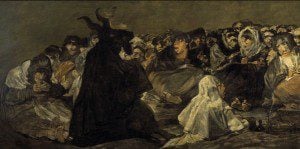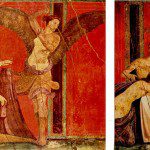
I’m really struggling to meet a deadline this week, so I hope you’ll forgive me if I re-run an old article from my Agora days. I was inspired by some things going on around me in my community at the moment, and also by the latest article on Oathbound.
I started a new teaching coven a few days ago. I wasn’t going to for quite some time. Coven leadership is a lot of work, and it’s an incredible emotional and temporal investment. But the Lady sent a bunch of eager new people my way, and I realized that Diana was reminding me of the calling I agreed to undertake. As I settle into working with this new group, I find myself going over the basics of establishing a new coven, and thought I would share with you the things I wish someone had told me when I started out.
Establish a Safe Space
Magickal work requires you to face your subconscious personal issues. It is said that the gates above the doors of Eleusis read, “Know Thyself.” In many ways, it becomes a bit like a support group. It is important to establish that kind of safe environment so that your students can be comfortable with doing this necessary Work. First, make sure that everyone understands that anything said in coven is confidential. Second, once the group has established itself (within the first two or three meetings) don’t allow new coveners without very careful scrutiny and the mutual agreement of the rest of the coven. Third, when disputes inevitably arise between covenmates, encourage them to work it out much as siblings do, with you serving in a role of mediator/facilitator if necessary.
Outline Expectations
They say that “assuming” makes an “ass” out of “u” and “me.” I have learned that it is very important to delineate your expectations when the group is established, otherwise feelings will get hurt and someone (likely you) will feel as though you are being taken advantage of. I have a very firm policy: I will not bear any of the financial burdens of running a coven (such as cakes, ale, candles, incense, handouts, gas and travel) because my time and my instruction are already a significant contribution. But I don’t charge fees, either; I just expect people to do, and pay, their share. I have had students promise to pay my gas to drive for 2 hours and then not do it, demand rides from me to the meeting site, or expect me to give them an entire book’s worth of paper handouts for free. I also refuse to be the one who always has to arrive early to set up the altar and leave an hour later because I was left to clean up. It is not inappropriate to expect a certain level of adult responsibility from your students, and I believe it’s actually good for their training because it teaches them about the Wiccan Rede.
Group Structure
It’s important to be clear about the structure of your group. Do you make most decisions by consensus (in which case, your role is that of facilitator) or is your tradition hierarchical (in which case, your role is leader and organizer?) There are merits and flaws to both approaches. If members have grievances, how do they resolve them? How intimate is your group? Are you just a teaching circle (read: classroom,) or are you a group of friends, or do you embrace the deep emotional connections that often come with searching your subconscious and dealing with the issues found there? If your students object to your work as Guide, do they have the right to take over somehow or do they need to go and start their own group; and is there an established process for this? What are the expectations of each of the degrees of study, if your tradition acknowledges degrees? Whose job is it to host, whose is it to phone everyone, and whose is it to set up the altar?
Be Aware of Group Dynamics
A coven is a small, very intimate group. In many ways, it is like a family. Human nature often leads us to play out the dynamics of our family of origin in such small groups. This is going to create all kinds of interpersonal concerns. Your coveners will project elements of their families and histories upon you and their covenmates. I would like to say that it doesn’t always happen, but in my experience I would be lying. Understanding the circumstances your coveners come from might give you some clues as to how that might manifest when it does, and help you overcome the issues that are created, especially when they reach the equivalent of Second Degree.
Sometimes, however, differences are irreconcilable. There should be a process for expelling troublesome members. It should always be the last resort, but there are certain problem personalities and situations that are always bad news and will destroy your coven. Amber K’s book Coven Craft offers a breakdown of some of them.
Theology and Practice
A coven requires a consistent theology and practice in its workings to be magickally effective. This helps the coveners attune to the coven egregor and the symbolism being used. I find it’s good to be specific. I tell my students, “This is not the only way to do Wicca, and all ways are valid; but this is the way that we are doing Wicca in this group. You are welcome to do whatever you want in your private practice, however.” And then I stick to it. Sometimes “because I said so,” really is a legitimate response.
When to Let Go
Eventually, all things come to an end. Your students will (at least if you’re doing your job) outgrow your teachings. Like being a parent, sometimes the hardest thing in the world to do is to release the apron strings. There are things you can do to ease the process. One is to encourage your more advanced students to aid with the teaching of newer students. Another is to allow them to lead ritual once in a while. A third is to insist upon participation (such as calling the quarters.)
Sometimes, students will decide to move on of their own accord. That’s their choice. Be satisfied that you have contributed to their magickal development and let it be.
And sometimes, a group just dissolves. My last coven ended when the majority of the students reached their second degree and decided to found their own coven. Ebb and flow applies to groups too.
You can get all the latest updates at the Between the Shadows Facebook page. Or you can read Between the Shadows directly on the Patheos Pagan site.
















